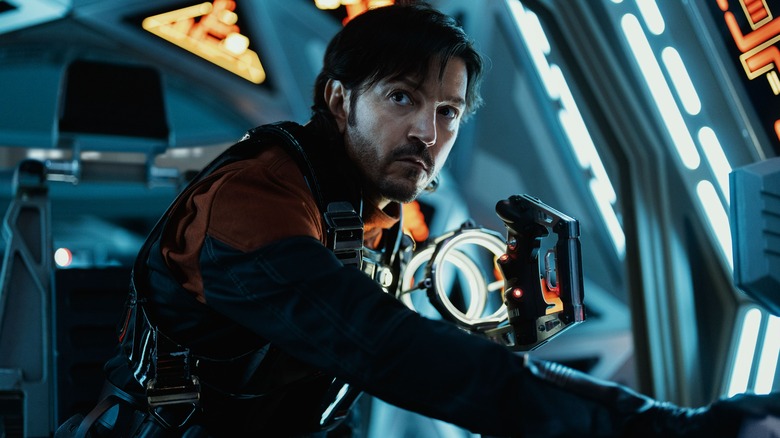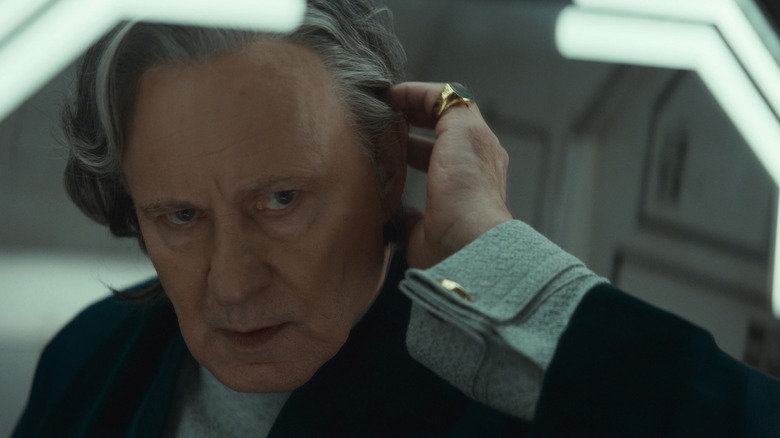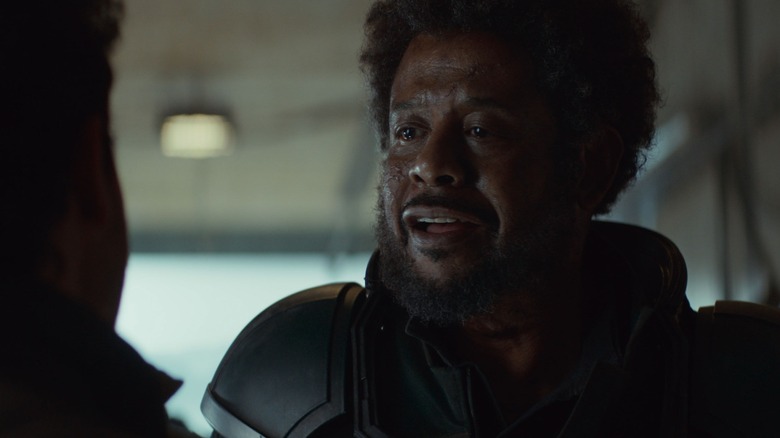Andor Season 2 Explores The Extreme Ends Of The Rebel Cause Like Never Before
This post contains spoilers for "Andor."
The latest season of "Andor" has been steadily gaining momentum, with its first six episodes already laying a sturdy foundation for the inevitable. It is certainly not easy to sustain tension when the end of an arc is a foregone conclusion, which is very much the case with Cassian (Diego Luna), who dies a martyr in "Rogue One." Although Cassian's fate is written in stone, we still care deeply about his evolving ethics in "Andor" and how he will arrive at his preordained future. Moreover, "Andor" has never shied away from the visceral discomfort of being part of the rebel cause, which comes with its own set of moral conundrums that demand constant and unflinching sacrifice. As a result, the Rebellion means something different for everyone, even if the end goal is to topple the Empire for good.
Although Cassian and Luthen (Stellan Skarsgård) are still aligned, their repeated clashes make these ideological differences very clear. In Episodes 4-6, we see Luthen push Cassian's buttons after he returns from the Ghorman negotiations, visibly agitated by the local resistance group's impulsivity. While Cassian (correctly) gauges that the Ghorman front is too eager/impatient for their own good, Luthen wants to use this desperation as a shining beacon for the Rebellion. He is aware of the risks posed, along with the deaths that are waiting to happen, but is willing to pay the price nonetheless. In contrast, Cassian cannot make peace with this stance, as he still wants to hold on to his humanity, at least towards those who are on the same side as him.
Then there are those like Saw Gerrera (Forest Whitaker) and Mon Mothma (Genevieve O'Reilly), who are fighting completely different battles for the same cause. We see Gerrera double down on his extremist beliefs, while Mothma feels increasingly helpless about her public-facing neutrality as a member of the Senate. These extreme ends flesh out the Rebel cause as a complex, evolving organism in "Andor," which must morph until it is strong (and unified) enough to devour a fascist superstate.
In Andor, even seasoned rebels like Luthen are losing track of their schemes
In episode 5, Luthen and Kleya (Elizabeth Dulau) get into an argument after they realize that one of their bugged antiques is going to be a part of a security sweep by a paranoid Davo Sculdun (Richard Dillane). "I can't keep track of it anymore," Luthen grumbles, referring to the endless stream of lies and false information he has been feeding the Imperials to mask the gestating aspects of the Rebel cause. Although Kleya later manages to retrieve the bug in plain sight, it is the kind of risk Luthen is unwilling to take at such a critical juncture. Although we are not privy to Luthen's past yet, we know he has already burned his decency and adopted the tactics of his enemy to level the playing field. Playing such a rigged, dirty game comes with consequences, and Luthen is well aware that he must act fast before things reach a point of no return.
This, in part, explains why he is so eager to take a gamble on Ghorman, as it is a once-in-a-lifetime opportunity to rally more allies to the Rebel cause, no matter how bloody the aftermath. When Cassian expresses concern about Ghorman going up in flames, Luthen simply reasons that it will "burn very brightly," solidifying itself as a new frontier against the Empire. Although we are yet to witness the Ghorman Massacre, we know that it is an unavoidable tragedy that will end up altering the trajectory of the Rebellion for the years to come.
Speaking of Ghorman, the local resistance group is in a complicated spot right now. On the one hand, they're impulsive for a reason, as it is truly impossible to take measured steps when your world is falling apart. Moreover, the Ghormans are already shouldering the burden of a historical tragedy that took place 16 years ago, and are rightfully on edge due to the Empire's increased hold over the planet. But at the same time, they're being rash, putting their faith in the likes of Syril (Kyle Soller), who is an ISB pawn placed on Ghorman to ensure that the resistance does the wrong thing.
This happens in the most heartbreaking way when Samm (Abraham Wapler) accidentally shoots Cinta (Varada Sethu), leaving Vel (Faye Marsay) devastated. Although Samm's missteps are rooted in inexperience, it costs the life of a rebel hero who had so much to offer to the world apart from her bravery.
The Rebel cause in Andor is a mix of contrasting moral positions and nuances
While rebels like Cassian and Luthen are still able to work together despite their differences, some perspectives are too extreme to be a part of an organized rebellion. A prime example is Gerrera, who urges Wilmon (Muhannad Bhaier) to breathe in the starship fuel Rhydonium, as he likens it to an unbridled expression of freedom and resistance in a mad world. As "Star Wars" history dictates, Gerrera's increasingly extremist worldviews will eventually clash with the fully formed Rebel Alliance soon, forcing the Alliance High Command to officially censure him and cut off all ties with the Partisans.
"Andor" doesn't defend or demonize Gerrera's mindset, but simply puts it into context. He's a child of strife and exploitation, forever scarred by the brutality of the enemy, who do not hesitate to adopt a kill-or-be-killed worldview. When someone is shaped by such grief and turmoil, isn't it understandable for them to always be on guard, forever apprehensive of betrayal? It is no surprise that Gerrera pours his pent-up bitterness/vitriol into extremist methods of thwarting the Empire, which also violently clash with the Rebel Alliance's efforts to organize the cause under one banner. "Aren't you tired of fighting with people who agree with you?" Luthen asks Gerrera in season 1, but the latter is quick to point out that factionalism is a natural byproduct of conflict, where the ends justify the means (even the most extreme means) when the goal is to combat fascism.
Then we have those facilitating these fights through funds, influence, and institutional authority, such as Mon Mothma, who is currently too tied down by her position to fight back. Although Mothma is not on the front lines, she has had to lead a suffocating double life to ensure that every rebel effort — from Aldhani to Yavin IV, and beyond — is made possible. However, she's so far removed by the ethical ruthlessness of it all that an act of murder carried out to protect the cause shatters something inside her. Although Mothma is yet to make her true allegiance known to the public, her transition into a full-fledged Rebel leader is only a matter of time.
While our rebels in "Andor" might not agree with each other on key issues, they must band together to fight the Empire as a united front, or as united as they can be. After all, when a weapon of mass destruction like the Death Star looms over the fate of the galaxy, these ideological extremes are reduced to nothing but petty differences.
New episodes of "Andor" premiere Tuesdays at 9 p.m. EST on Disney+.


